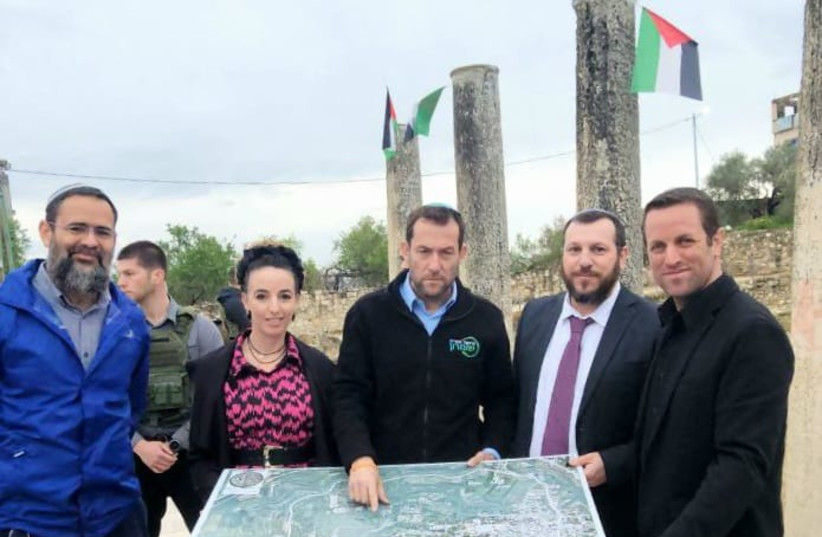The Palestinian Authority has paved a new road through an archaeological site in Sebastia in the northern West Bank, right-wing activists warned on Tuesday.
The Sebastia Municipality posted a video on Monday night showing the works on the road stating that it leads from the northern area of Sebastia to the entrance of an ancient Roman horse racing stadium. The municipality noted that work on the road is continuing.
Sebastia has been a site of constant arguments and clashes between Israelis and Palestinians, with right-wing activists warning for years of damage being done to archaeological sites and Palestinians opposing the entry of Israelis into the site.
A photo posted by the municipality over the weekend showed Palestinian flags put up at an archaeological site in Sebastia with the caption "they are staying here."
Sebastia: A site of constant arguments, clashes between Israelis and Palestinians

The "Protecting Eternity" organization, along with patrollers from the lands department of the Samaria Regional Council and Kedumim found heavy construction equipment working to pave a road on a route through an archaeological site in Areas B and C. Area B is administered by both the PA and Israel, while Area C is administered by Israel. Area A is exclusively administered by the PA.
During the works on the road, a wall from the Herodian era was destroyed and burial caves from the Second Temple period were broken into and looted, according to the organization. The organization claimed that Palestinian activists threw pig carcasses into the ancient graves.
Samaria Regional Council head Yossi Dagan called for the government to stop the work, warning that "an attempt is being made here to completely disconnect the State of Israel and the Jewish people from one of its most important and precious heritage sites. A single remnant of the ancient Kingdom of Israel."
"This is a disgrace and destruction of Jewish history, right under the nose of the State of Israel, every Israeli and every lover of culture should demand that any damage to the site be stopped immediately. 24/7 military security should be immediately put in place to protect a world heritage site that is being barbarically and systematically destroyed day after day by the terrorist Palestinian Authority."
Moshe Gutman, chairman of Protecting Eternity, stressed that "we are losing ancient Samaria."
"The destruction continued for over a month without any real reaction, without the arrest of any of the perpetrators of the destruction in the [Palestinian]Authority and the municipality of Sebastia. And now there is also a desecration of graves," added Gutman. "The government of Israel must respond immediately and strongly just as it would have responded if a bulldozer entered the Caesarea National Park or if Iran had erased Mordechai and Esther's tomb. Don't be silent!"
"The Palestinian Authority continues its horrendous attempt to erase Israel's rich biblical history," said MK Dan Illouz. "We will stop this atrocity and we will not allow them to demolish our past. Their fear of our history only highlights our eternal right to our land."
On Tuesday afternoon, Environmental Protection Minister Idit Silman and Heritage Minister Amichai Eliyahu visited Sebasita with Dagan, stating that they would advance a government decision to develop the site.
"The Palestinian Authority works systematically to destroy the archaeological remains that testify to the deep and historical connection of the people of Israel to their country," said the two ministers. "The serious damage to the National Park and outside of it in recent years and the erasure of the remains of the capital of Samaria and one of the most important sites in the history of the Jewish people is the erasure of us from Tel Aviv and Jerusalem. The war for Sebastia is also the war for Tel Aviv."
The two ministers also called for a permanent military presence to be established at the site and for the site to be fenced in.
